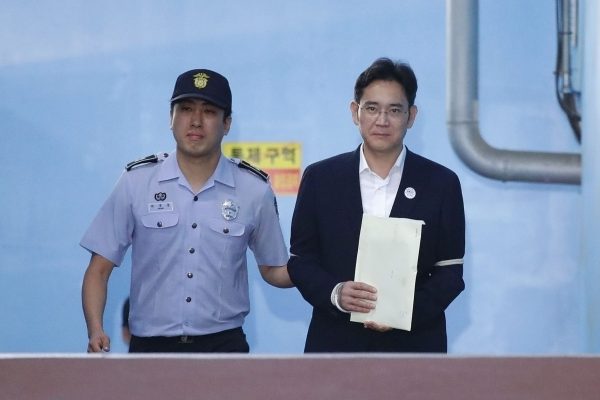The court has so far confirmed 7.2 billion won (US$6.8 million) in bribes designed to win the government’s approval of a controversial merger between two Samsung units. The merger would have increased Lee’s control over the entire Samsung empire, cementing a power transfer from his father, Lee Kun-hee, who has been in a coma since 2014. According to South Korean criminal law, those found guilty of offering bribes are subject to a prison term of up to five years. Those convicted of receiving bribes are subject to at least five years in prison, and up to a life sentence when the amount is more than 100 million won (US$88,000).
Given that Samsung and its 70-plus subsidiaries account for some 25 per cent of South Korea’s GDP — the fourth-largest economy in Asia — Lee’s conviction seems to symbolise a turning point in the country’s historically cosy government–chaebol relationship. But the extent to which this symbolism will convert into reality needs to be observed with caution.
The South Korean government–chaebol coalition has degenerated into a winner-takes-all political economy in which chaebols have accumulated an exorbitant pile of cash reserves, as they have monopolised the country’s gains from economic growth with minimal trickle-down effect. The total internal reserves of the 30 largest chaebols, for example, increased from 330.1 trillion won (US$297 billion) in 2010 to 500.2 trillion won (US$442 billion) in 2014, which was a 51.5 per cent increase during this five-year period. Yet investment by these 30 chaebols increased by a total of just 2.2 trillion won or 3.5 per cent. The size of chaebols in the South Korean economy is so huge that their failure would be devastating for economic stability.
Chaebol reform, especially by shaking-up their ‘accumulated evils’ — including anti-market practices and illicit favours — was one of the key election promises of President Moon Jae-in. So far, Moon’s declaration of what he termed ‘J-nomics’, a new paradigm for job-led growth departing from his predecessors’ chaebol-oriented growth, has effected little change other than a flood of new policies and personnel appointments. This includes that of Kim Sang-jo, a former university professor with the nickname ‘chaebol sniper’, to head the Korea Fair Trade Commission. In this context, Lee’s jailing is a bold move on the part of the criminal court.
But there is a long way to go before one can expect any major reform of chaebol or of the relationship between government and business. The two are much too interdependent. For this obvious reason, Kim openly urges the chaebols to voluntarily reform their ‘cobweb-like family-run governance structure to meet market expectations and restore fair competition’. At the same time, he has drawn an initial deadline of December 2017 before he’ll take ‘appropriate action’, especially regarding the four top-ranking business groups: Samsung, Hyundai Motors, SK and LG.
Although Lee has filed an appeal, the verdict has already created an avalanche of challenges for not only the four top-ranking business groups, but also South Korean businesses as a whole. Yoon Boo-keun, President and CEO of the consumer electronics division of Samsung Electronics, openly admitted that his company recently lost a business opportunity to acquire an artificial intelligence technology firm, and remarked that he feels like he is ‘sailing without a captain’.
South Korean business as a whole is already feeling suffocated by a stream of challenges including China’s on-going economic revenge for South Korea’s agreement to install the US THAAD anti-missile system, and the Trump administration’s threat to scrap the South Korea–US free trade agreement.
South Korean business also fears that the security risk entailed by North Korea’s sixth nuclear test might turn into a ‘mega-size economic blow’ by affecting the two largest global markets: China and the United States. Instead of exploring how these internal and external risks can be managed, the conservative Chosun Ilbo editorial has argued that the Moon government has become an ‘epicentre of amplifying these risks by itself’.
Although Lee’s verdict has aroused much heated debate, his verdict may not necessarily embolden the Moon administration’s attempt at chaebol reform, let alone a paradigm shift towards strengthening corporate governance, as Moon’s J-nomics planned. On the other hand, the unprecedented leadership vacuum, with Lee being in jail, may have already signalled inevitable change in corporate governance structures. But whether that change will lead to the end of the so-called ‘Samsung Republic’ is an entirely different matter, one of changing the indissoluble winner-takes-all corporate culture that has shaped the lives of the South Korean people, especially for the last 20 years.
Hyung-A Kim is Associate Professor of Korean Politics at The Australian National University.


It will be especially interesting to see how/if Moon chooses to proceed with his J-nomics and chaebol reform in the context of the security threat from N Korea. He could, understandably, claim that any such dramatic changes to the economy/society would be too complex as long as the threat of war is overhanging the country. There is nothing like an external existential threat to get a leader to change his domestic programs and perspective.
With all that money that the chaebols have, you think they could use the money to put the people back to work with full-time, permanent, good paying jobs?